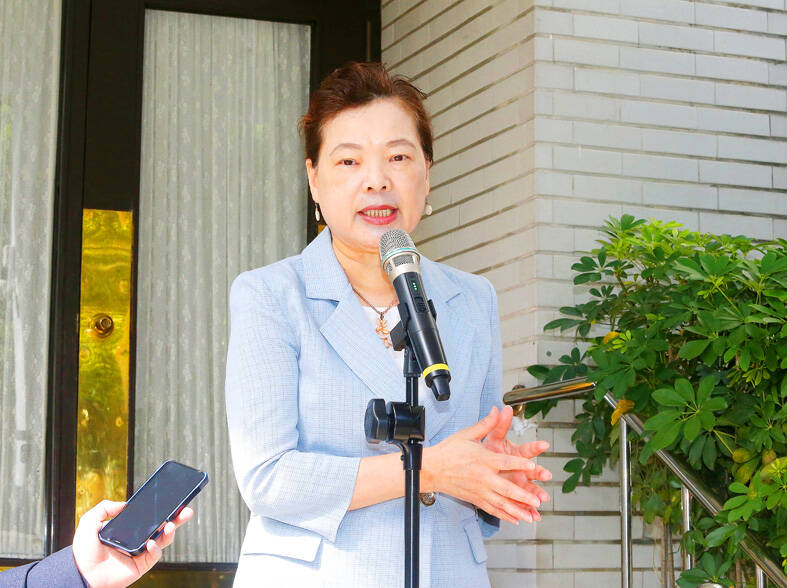Taiwan and the US are important business partners, Minister of Economic Affairs Wang Mei-hua (王美花) said yesterday, in response to former US president Donald Trump saying Taiwan took away the US’ semiconductor business.
Many of Taiwan’s major chip customers are from the US, while Taiwan sources many of its semiconductor equipment from the US, Wang said.
“So Taiwan and the United States have become important business partners, instead of rivals,” Wang told reporters on the sidelines of a meeting at the Legislative Yuan.

Photo: CNA
In an interview with Fox News earlier this week, Trump was asked whether the US should help defend Taiwan if it means going to war with China.
“If I answer that question, it’d put me in a very bad negotiating position,” Trump said, but then pivoted to the business angle.
“With that being said, Taiwan did take all of our chip business. We used to make our own chips. Now they’re made in Taiwan,” he said.
“Remember this. Taiwan took — smart, brilliant — they took our business away. We should have stopped them. We should have taxed them. We should have tariffed them,” Trump said.
Trump’s comments drew widespread attention in Taiwanese media, with some suggesting he was hinting that he would not come to Taiwan’s defense if China attacks, and others saying he would restrict bilateral trade in semiconductors.
Wang said the US has repeatedly said Taiwan is an important partner, as both sides have built close business ties, including their partnership in the semiconductor industry.
The semiconductor industry has a complicated and diversified supply chain in which every country has its own role to play to allow the industry to prosper, she said.
The US, for example, plays a big role in advanced chip design and semiconductor equipment manufacturing, while Japan and Europe supply semiconductor raw materials and equipment respectively, she said.
Taiwan specializes in pure wafer foundry and IC packaging and testing services, with about 90 percent of high-end chips rolled out from Taiwan.
Jackson Hu (胡國強), a former chairman and CEO of United Microelectronics Corp (UMC, 聯電), had a more succinct response to Trump’s comments.
“Trump is completely ignorant about the semiconductor industry,” Hu was quoted as saying by Digitimes Asia.
Premier Chen Chien-jen (陳建仁) said that Taiwan and the US mutually benefit from bilateral trade, as both sides have a consensus to push for such a relationship, citing the signing of an initial agreement on the US-Taiwan Initiative on 21st-Century Trade on June 1 as an example.

TAKING STOCK: A Taiwanese cookware firm in Vietnam urged customers to assess inventory or place orders early so shipments can reach the US while tariffs are paused Taiwanese businesses in Vietnam are exploring alternatives after the White House imposed a 46 percent import duty on Vietnamese goods, following US President Donald Trump’s announcement of “reciprocal” tariffs on the US’ trading partners. Lo Shih-liang (羅世良), chairman of Brico Industry Co (裕茂工業), a Taiwanese company that manufactures cast iron cookware and stove components in Vietnam, said that more than 40 percent of his business was tied to the US market, describing the constant US policy shifts as an emotional roller coaster. “I work during the day and stay up all night watching the news. I’ve been following US news until 3am

UNCERTAINTY: Innolux activated a stringent supply chain management mechanism, as it did during the COVID-19 pandemic, to ensure optimal inventory levels for customers Flat-panel display makers AUO Corp (友達) and Innolux Corp (群創) yesterday said that about 12 to 20 percent of their display business is at risk of potential US tariffs and that they would relocate production or shipment destinations to mitigate the levies’ effects. US tariffs would have a direct impact of US$200 million on AUO’s revenue, company chairman Paul Peng (彭雙浪) told reporters on the sidelines of the Touch Taiwan trade show in Taipei yesterday. That would make up about 12 percent of the company’s overall revenue. To cope with the tariff uncertainty, AUO plans to allocate its production to manufacturing facilities in

Six years ago, LVMH’s billionaire CEO Bernard Arnault and US President Donald Trump cut the blue ribbon on a factory in rural Texas that would make designer handbags for Louis Vuitton, one of the world’s best-known luxury brands. However, since the high-profile opening, the factory has faced a host of problems limiting production, 11 former Louis Vuitton employees said. The site has consistently ranked among the worst-performing for Louis Vuitton globally, “significantly” underperforming other facilities, said three former Louis Vuitton workers and a senior industry source, who cited internal rankings shared with staff. The plant’s problems — which have not

COLLABORATION: Given Taiwan’s key position in global supply chains, the US firm is discussing strategies with local partners and clients to deal with global uncertainties Advanced Micro Devices Inc (AMD) yesterday said it is meeting with local ecosystem partners, including Taiwan Semiconductor Manufacturing Co (TSMC, 台積電), to discuss strategies, including long-term manufacturing, to navigate uncertainties such as US tariffs, as Taiwan occupies an important position in global supply chains. AMD chief executive officer Lisa Su (蘇姿丰) told reporters that Taiwan is an important part of the chip designer’s ecosystem and she is discussing with partners and customers in Taiwan to forge strong collaborations on different areas during this critical period. AMD has just become the first artificial-intelligence (AI) server chip customer of TSMC to utilize its advanced